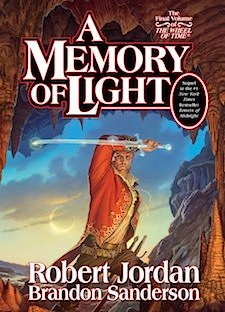In these times of change, it’s a Wheel of Time reread!
Today’s entry covers Chapter 21 of A Memory of Light, in which we have angst, sexism, and mind-rape. And other fun things!
Previous reread entries are here. The Wheel of Time Master Index is here, which has links to news, reviews, interviews, and all manner of information about the Wheel of Time in general. The index for all things specifically related to the final novel in the series, A Memory of Light, is here.
Also, for maximum coolness, the Wheel of Time reread is also now available as an e-book series, from your preferred e-book retailer!
This reread post, and all posts henceforth, contain spoilers for the entire Wheel of Time series. If you haven’t read, read at your own risk.
And now, the post!
 Chapter 21: Not a Mistake to Ignore
Chapter 21: Not a Mistake to Ignore
What Happens
Siuan and Yukiri move among wounded soldiers in the Arafellin camp where the remainders of Egwene’s forces had fled after the Sharan attack, Healing those who could still fight. Siuan is exhausted, though, and Yukiri tells her to rest. Siuan remembers how uneasy Bryne had been before the strike, and how they had barely escaped by jumping through one of Yukiri’s floor gateways and onto a giant cushion of Air to break the fall.
And Yukiri kept saying she thought the weave might be the secret behind discovering how to fly! Fool woman. There was a good reason the Creator hadn’t given people wings.
She finds Bryne with General Haerm, the new commander of the Illianer Companions, who reports there is no sign of the Amyrlin, but Siuan insists they keep looking. Haerm leaves, and Siuan pretends to complain about Bryne pushing her through the gateway. He tells her that they have lost half their troops and nearly a third of the Aes Sedai. Siuan stubbornly insists that Egwene is alive, and Bryne agrees, but then berates himself for missing the significance of the Trollocs’ defensive move.
“I can’t see how I let this happen. I’ve trained better than this, prepared better than this! It’s not just a mistake I can ignore, Siuan. The Pattern itself is at stake.”
Siuan doesn’t know what to say, and they sit in silence.
![]()
Outside the Black Tower, Lyrelle, Myrelle, and Seaine argue over whether the newly-arrived emissary from the Asha’man, who claims that the M’Hael and the other Darkfriend Asha’man were driven out, can be trusted. Lyrelle is skeptical, but admits that the White Tower had also needed cleansing of the Shadow, and decides they and the thirty-odd sisters she has with her should go in and bond the men they were promised. She plans to try to arrange for them to bond (and thus control) the most powerful of the Asha’man they can, for she does not believe that the taint has truly been cleansed, and cautions the other sisters to hold onto saidar just in case.
Her women would be a match for a larger number of untrained Asha’man, if it came to that. It shouldn’t, logically. Of course, the men were likely mad. So perhaps assuming logic from them was imprudent.
Lyrelle is startled and displeased when a Red sister, Pevara Tazanovni, greets them at the gate. Pevara tells them Logain Ablar leads here now, but he is still recovering from his wounds. Lyrelle thinks it is a pity the false Dragon hadn’t died, as men without a strong leader are more easily controlled. She asks Pevara if bonding a channeling man is different from a non-channeling one, and Pevara confirms that Asha’man cannot be compelled through the bond like ordinary Warders, and she will have to be more “inventive.”
“How obedient are they?” Aledrin asked from the other side.
“It depends on the man, I suspect,” Pevara said.
“If they cannot be forced,” Lyrelle said, “will they obey their Aes Sedai in battle?”
“Probably,” Pevara said, though there was something ambiguous about the way she said it. “I must tell you something, all of you. The mission I was sent on, and the one you also pursue, is a fool’s errand. […] Bonding the Asha’man just to bond them is foolish. It will not control them. I do think some Asha’man will make excellent Warders, but— like many men— others will not. I suggest that you abandon your plan to bond exactly forty-seven and take those who are most willing. You will gain better Warders.”
Lyrelle pretty much ignores this, and Pevara sighs. Lyrelle reflects on how perhaps putting the Black Tower under her control could finally get her out from under Lelaine’s thumb, and ponders whether there is a way around the lack of obedience to the bond. They soon reach a line of Asha’man which Lyrelle realizes numbers exactly forty-seven. One of them introduces himself as Androl Genhald, and regrets that these are the only Asha’man available to be bonded. Lyrelle snaps that they will wait for the others to return, but Androl doesn’t think that will happen anytime soon. Lyrelle denounces this “a childish trick,” but Androl answers he thought it was one rather worthy of Aes Sedai, and further points out that these are the ones who actually volunteered to be Warders.
“Here’s the thing, Aes Sedai,” Androl said. “The Dragon Reborn sent a message to us, just earlier today. He instructed us to learn one last lesson: that we’re not to think of ourselves as weapons, but as men. Well, men have a choice in their fate, and weapons do not. Here are your men, Aes Sedai. Respect them.”
He leaves with Pevara. Lyrelle considers refusing, but news from the front is alarming, and eventually she snaps at the other sisters to choose two each, except for a few who will only get one.
![]()
Pevara comments that she’d forgotten how cold some Aes Sedai could be, and warns Androl to be wary, but Androl answers that they won her over, so he is not worried. They meet up with Canler, Jonneth and Emarin; Emarin is still traumatized by being subjected to the Turning process. Pevara chastises them for still being here when they could be forced into being Warders, but Jonneth is confident that Androl would get them away. Canler asks what they are to do now, and Androl answers they will follow Logain.
Logain had… changed since the ordeal. Androl whispered to her that he was darker now. He spoke less. He did still seem determined to get to the Last Battle, but for now, he gathered the men in and pored over things they’d found in Taim’s rooms. Pevara worried that the Turning had broken him inside.
Pevara asks about the Dragon Reborn, knowing that Naeff’s message had also carried the implication that al’Thor had known there was something wrong at the Black Tower, and yet had not come to do something about it. Jonneth insists he would have come if he could have, but Emarin counters that he left them to survive or not on their own, and calls it callous. Androl answers that it doesn’t matter, as the Black Tower has hardly ever had anything to do with the Dragon Reborn in the first place; it is Logain who has his allegiance. Pevara reflects that perhaps it is for the best, since the Dragon will die in the Last Battle anyway.
“I will take his last order to heart, however,” Androl said. “I will not be merely a weapon. The taint is cleansed. We fight not to die, but to live. We have a reason to live. Spread the word among the other men, and let us take oaths to uphold Logain as our leader. And then, to the Last Battle. Not as minions of the Dragon Reborn, not as pawns of the Amyrlin Seat, but as the Black Tower. Our own men.”
“Our own men,” the other three whispered, nodding.
Commentary
Well, uh, so clearly Yukiri survived. Still not sure about Lelaine.
The scene between Siuan and Bryne is a hell of lot more poignant when you know that Bryne’s not just fucking up, but that he’s being subconsciously manipulated to fuck up. Because obviously on some level he senses it, just like Morgase did with Rahvin, which leads me to reiterate a lot of things I’ve already said about the horrors of mind-rape, in a world that has it, probably not being any less horrific than actual rape.
Because it’s part and parcel of the same thing. It’s about having your power, your agency, and your control over your own self being forcibly taken from you, and what’s more, it’s about using that stolen control to make you harm either yourself or those you love, or both. And there are no words to describe how utterly horrific and reprehensible that is.
Ugh.
The scene is also doubly affecting once you know the characters’ eventual fate, but we’ll get to that in due time.
So, did Lyrelle utterly piss you off in this chapter? Did she make you grit your teeth? Did you want to smack her upside her appallingly condescending head?
I certainly hope so, because the Lyrelle section of this chapter was one of the most perfectly executed examples of gender-flipped sexism I’ve seen in this series, and as such it was infuriating, but it was also awesome.
Because this—this is exactly what women are talking about when they try (and, often, fail) to explain sexism to men. Overt leering and whatnot is not the problem, or not the main one; it’s the mindset that is the problem. It’s the insidiously unexamined assumptions; the unconscious (and therefore maddeningly difficult to articulate or refute) assertion of privilege, that is so hard to protest against.
Read Lyrelle’s POV again. Not my summary of it, which doesn’t do the heinousness of it justice, but the original text. Note how her only response to the Asha’man’s assertion of independence from Aes Sedai control is irritation, that they won’t understand their place. Note how her only response to the revelation that they cannot be forced to do her bidding is more of the same.
They are not people to her, not really; they are problems to solve, nuisances to control and use to her own ends. She only considers them in light of how they will advance her own agenda; beyond that they are nothing to her. It honestly never even occurs to her—or to many of the sisters with her—to consider that the Asha’man are capable of directing their own lives, of controlling their own agency or solving their own problems.
Because of course they can’t: they’re men, right? Channeling men, at that. How dare they assert themselves? Don’t they know how dangerous it is when they step out of their assigned roles (to be subdued, to be gentled, to be quiet)? What difference does it make what they want? They are flighty, unreliable, inherently inferior. They are in the throes of a biologically mandated madness, to boot—and of course it can’t be that everything Lyrelle thinks she knows about this madness is wrong. It can’t be that the people who have actually experienced this problem might know more about it than she does, right? Noooo, that’s just silly.
“Respect them,” Androl said to her, and that was such the perfect thing to say, because that, in the end, is what any true advocate of an oppressed group wants: not ascendancy, not revenge, but respect. Equality. The acknowledgement that they are human beings just like everyone else. And that is precisely what Lyrelle fails to give, in thought or in deed, except where she is pressured into doing so. But that is still only lip service, and in the end it changes nothing.
Seeing any parallels, there? Hmm?
Not so nice when the shoe is on the other foot, is it?
There is, of course, another point being made here, which I think I have addressed before, but if so I don’t remember what I said about it. But in any case, the other point (or rather, implication) being made here is that if gender roles were reversed, women wouldn’t be any better about it than men are.
My kneejerk reaction is to protest that that can’t possibly be true, but I am smart enough to realize that that is a kneejerk reaction. I would like to believe that isn’t true, but honestly in the real world there just isn’t enough data on such a thing to draw a conclusion—at least, not that I am aware of. If anyone does know of such data I’d love to hear about it.
But all things being equal (pun intended), the general trend in human history has been that those who have power over those who don’t have, sadly, rarely or never failed to succumb to the temptation to abuse that power—and to make assumptions about the less privileged group that justify why that abuse is okay.
Which is why, sez me, that insuring equality for all is so important. You cannot abuse an imbalance of power where none exists.
Ah, me and my crazy ideals.
Anyway. This whole thing also puts Pevara into the position of being the Randland equivalent of a soi-disant male feminist, which provides its own interesting parallels. Not only of Pevara’s own sort-of futzing her own support for the Asha’man in the face of her peers (you’ll have to “be inventive,” Pevara? Really?), but most notably of how Lyrelle dismisses Pevara’s arguments as being beneath her the moment she identifies Pevara as being an “ally” of the Asha’man. Not to mention how she assumes Pevara can only possibly be inspired to defend the Asha’man by the basest of motives, i.e. that she is fucking Androl. It is amazing how prejudice and privilege can reduce something that should be wonderful—such as the growing romance between Androl and Pevara—to something tawdry and cynical. Blah.
Moving on, I was also intrigued by Pevara’s thoughts that Rand had done the Asha’man an inadvertent favor by abandoning them. Especially in light of how much railing I have done over the course of this reread about how stupid Rand was to do so. Because of course the thing is that Taim was always a trap, and yet it was a trap Rand himself set up. He was the one who put Taim in charge of the place, after all, despite having an unambiguously violent negative reaction to the guy the moment he clapped eyes on him.
I don’t know. I see the bind Rand was in when he initially set the Black Tower up in LOC, and yet I still think putting Taim in charge of it was the height of foolishness, even aside from the fact that he turned out to be a big ol’ Darkfriend in the end. Even if he hadn’t been Officially Evil™, he was still a devious jealousy-ridden megalomaniac with a ginormous chip on his shoulder. How else could that possibly have gone, except badly, I ask?
But okay. If it accidentally encouraged the Asha’man to be Sistahs Who Are Doing It For Themselves, I guess that’s great, and all. I just think Emarin’s got a point as well.
Lastly and most randomly: Yukiri’s theory that Air cushions can help you fly is kind of hilarious, in my opinion. Because all I could think of was Aes Sedai bouncing from one invisible trampoline to another, and going boingy boingy boingy boingy, and this is probably proof I watched way too many cartoons as a kid. Heh.
And on that at least slightly non-depressing note, we out! Have a lovely week, and I’ll see you next Tuesday!













